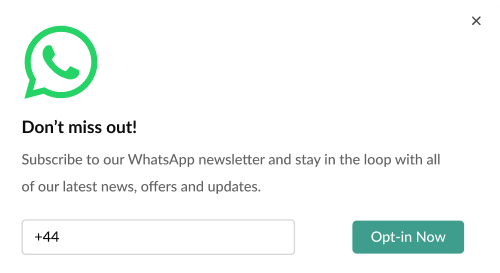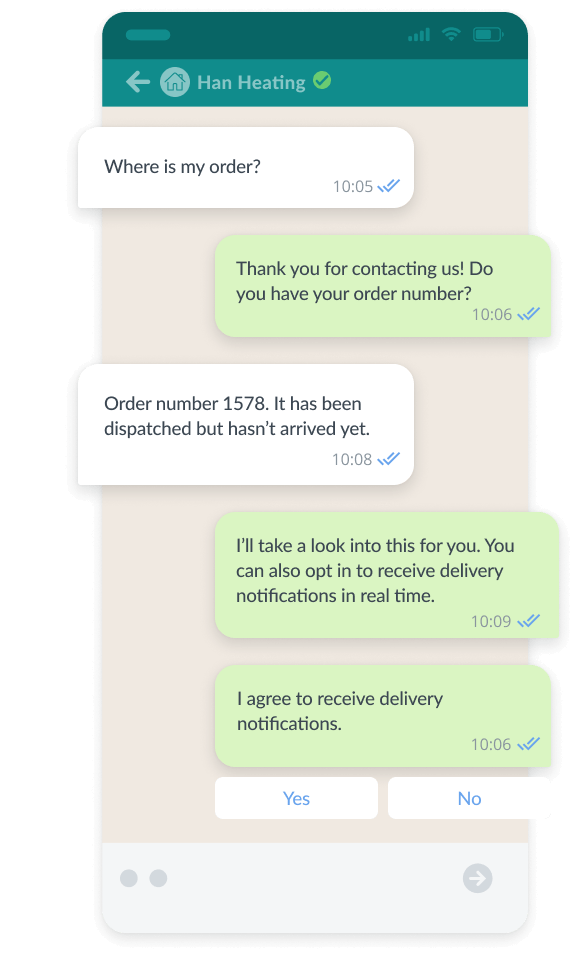
To get the most out of WhatsApp Business Platform, you must have a clear and compliant opt-in strategy. Read our guide below to learn more about WhatsApp opt-in.
Before you can start using WhatsApp to engage with customers, you need to ensure you’re compliant with WhatsApp’s opt-in requirements. Obtaining explicit permission from users is essential to avoid messaging violations and build a trusted communication channel.
In this guide, we’ll cover the rules around WhatsApp opt-ins, how to collect them effectively, and tips to improve your opt-in rate, so you can make the most of WhatsApp Business Platform for your marketing efforts.
What are the rules for WhatsApp opt in?
Meta’s opt-in policy for WhatsApp clearly states that a business must receive opt-in permission from a user before you send any communications them.
Your opt-in must:
- State the user is opting in to receive messages from your business via WhatsApp
- State the business name that the user is opting in to receive messages from
- Comply with applicable laws
Recipients should also be able to easily opt out if they no longer want to receive messages from your business. So you need to provide clear instructions for how people can opt out and honour these requests when they come through.
How to collect WhatsApp opt-ins
The good news is that collecting collecting opt-ins for WhatsApp doesn’t have to be complicated. Follow these steps to ensure your process is both compliant and effective:
1. Choose your opt-in method(s)
Whether you request opt-in via a user-initiated WhatsApp thread or a form on your website, it’s important that you have obtained permission to send customers communications via this channel.
Here are some ways you can request opt-in (use a combination of these for maximum effect):
Social media
A targeted social media ad campaign could help guide your audience to connect and engage with you via WhatsApp instead of just email.

Website
Ask customers if they’d like to opt in to receive WhatsApp updates when they’re entering their details on your website – for example, at checkout or when they’re signing up to your email newsletter.

WhatsApp thread
If a customer reaches out to you on WhatsApp, this could be your opportunity to ask if they’d be interested in receiving other types of messages from you via this channel.

Live chat
Did you know that 41% of customers prefer live chat over phone and email support channels? This shouldn’t come as a surprise – live chat and chatbots allow customers to quickly and easily reach out to you for support.
Why not use this to your advantage and end your live chat or chatbot conversations with a ‘sign up for updates via WhatsApp’ message?
You can do this by obtaining an opt-in that covers the different types of messages you will send (e.g. order updates or product offers). Alternatively, you can also obtain a separate opt-in by specific message category. This will help mitigate the risk of users blocking your business because they’re receiving unsolicited messages.
There are other methods too, including:
Phone – create an interactive voice response (IVR) flow.
In person – A customer could sign a physical document to give WhatsApp opt in permission.
2. Make it clear what type of messages you will be sending and what they will gain
This will help to lower your opt-out rate because it sets expectations. Plus, it mitigates the risk of people blocking your business because they’re receiving irrelevant or unsolicited messages.
3. Clearly state how people can opt out of receiving specific types of messages
As well as having a clear opt-in policy, make it easy for people to opt out of receiving communications from you via WhatsApp.
4. Respect all opt-out requests made
Whether the request is made on or off WhatsApp, you must update your customer’s opt-in preferences and/or remove that person from your contacts list.
5. Have high-quality conversations
It’s important to facilitate high-quality conversations between people and businesses. People can report or even block businesses which will impact their quality rating. Even just moving down a tier can significantly reduce your daily messages send so it’s important to keep your quality rating as high as possible.
The quality rating system corresponds to the messaging tiers that dictate the amount of messages businesses can send. The quality rating has three levels which include:
- Green – high quality
- Yellow – medium quality
- Red – low quality
You can find the quality rating and messaging limits for your account under the phone number tab in your business’s WhatsApp Business Manager. If your quality rating reaches a low state, you’ll receive an email and notification in the Manager as a warning. Your status will also change to Flagged or Restricted.
Meta may also reactively evaluate a business’ opt-in flows, including reviewing user feedback to flag policy violations and develop additional types of enforcement over time. Read more about quality ratings and limits in WhatsApp here.
Learn the Do’s and Don’ts of Whatsapp Business Messaging.
Improving your WhatsApp opt-in rate
When you allow users to opt in to receive messages via WhatsApp, you’re not only complying with Meta’s messaging policy, you’re also segmenting people who want to connect with you via this channel from those that don’t. It’s an opportunity for you to target a more receptive audience with personalised content and build more meaningful connections.
Here’s how to boost your WhatsApp opt-in rate:
- Clearly communicate the value of receiving updates via WhatsApp. What will the recipient gain by hearing from your business on WhatsApp? This could be exclusive offers, early access to sales or new product launches, or being kept up to date with latest information.
- Clearly state what kind of messages the customer is opting in to receive. What can they expect to receive from you?
- Don’t message customers too often to avoid the risk of coming across like spam. How often are you messaging customers?
- Provide clear instructions on how people can opt out of receiving messages on WhatsApp from your business. How easy is it for people to opt out?
- Always honour requests from customers when they want to change their message preferences or opt out from receiving communications. Have you got a process in place that ensures customers who have opted out are removed promptly from your subscriber list?
Engage your customers with WhatsApp Business Platform
As one of the world’s most popular messaging apps, the benefits of using WhatsApp to connect with consumers are clear. WhatsApp is a rich channel with arguably the highest reach so you can meet customers where they are and have one-on-one conversations that feel natural.
But it’s not as simple as just sending customers and prospects a WhatsApp message.
Get the most out of WhatsApp Business Platform with a clear opt-in strategy. Contact our team for more information and support with engaging your customers via WhatsApp.



